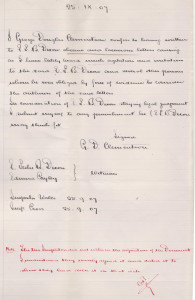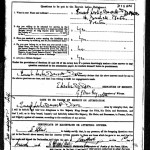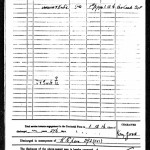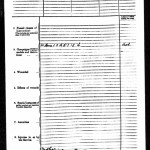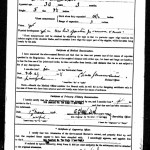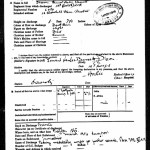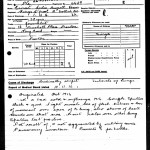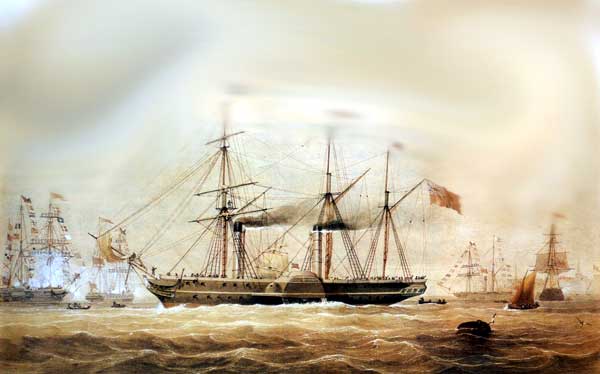 On 25 September 1907 two police inspectors were witness to statements and certain letters at the offices of Buck & Dicksons, 17, Winckley Street, Preston, Lancashire, England. These were written by George Douglas Clementson aged 27 of Ashton Under Lyne to Ernest Leslie Bassett Dixon aged 22 of Bushell Place, Preston.
On 25 September 1907 two police inspectors were witness to statements and certain letters at the offices of Buck & Dicksons, 17, Winckley Street, Preston, Lancashire, England. These were written by George Douglas Clementson aged 27 of Ashton Under Lyne to Ernest Leslie Bassett Dixon aged 22 of Bushell Place, Preston.
One hundred and four years later the letters and statement came into my possession. The content could well have sparked an Edwardian scandal. As a curious historian I am fascinated with the content and the two characters – the man in love and the man whom he adored. I have researched both of them. I discovered that one had a desperately short life, whilst the other lived into old age. One was Rugby and Oxford educated – an ‘author’ and ‘journalist’. The other working in a law firm and then (presumably following this episode) out of work and living on private means. Both born in the 1880’s, from a well-to-do upper middle-class background. Both in the same area in Lancashire. Although acquainted, one of them unaware of the others long-term desire. This was the Edwardian gentile age only seven years away from a world war that was to change their immediate lives forever.
George Clementson was playing a dangerous game that could have ended with a prison sentence. Yet, despite his openness and hopeless desire to express himself on a quite intimate level, he cared little of the danger to him or a potential alarm to Ernest Leslie Dixon who he was so infatuated.
The four letters reveal the seemingly inoffensive infatuation of George Clementson towards Leslie Dixon. Although they ramble along somewhat they do reveal in Victorian and Edwardian times how difficult it was for an unspoken feeling of affection to be expressed. It would appear that George Clementson knew Leslie Dixon socially and possibly through work connections although of course he didn’t reveal his identity until the very end when the two of them were making arrangements to finally meet.
The very fact that these letters were found in the hands of lawyers does indicate that either Leslie Dixon or his family decided to take certain action to end or even prevent a liaison taking place. It was to be another 60 years before homosexuality was to be legally recognised in United Kingdom, although we do know today that relationships and affairs did go on secretly behind closed doors during Edwardian times.
These are fascinating letters written by a love-sick infatuated Clementson (who calls himself “X”) to a presumably unsuspecting Dixon (who Clementson refers to as “D”). The style in which they are written are in parts quite beautiful in other parts marginally offensive and obscene to the untrained eye! But they do reveal an underlying Edwardian culture that had to remain underground for another two generations. This really was ‘the love that dare not speak its name.’
As the letters progress, arrangements are underway to enable Leslie Dixon to identify George Clementson, although they were socially acquainted it was clear that in fact the letters and affection was coming from someone quite close within their social circle. After George Clementson asked Leslie Dixon to wear a red tie to indicate he was interested in a liaison, Leslie carried out the request and placed a carefully coded advertisement in the local newspaper arranging to meet George. So the scene was set – a date arranged. But following the arrangements between the two men, the whole business was brought to an astonishing and abrupt end in a lawyers office with police officers present. George Clementson was forced to apologise for writing the letters and allegedly upsetting Ernest and, crucially, “others”. Although Ernest Dixon is witnessing the apology, he does not press charges. This leads me to presume a third party (“others”) intervened (possibly close family or even the police who might have intercepted the advertisement in the paper, the letters or both).
It’s difficult to work out whether Clementson’s love for Dixon was ever reciprocated. Within a very short time, by 1911 Ernest had relocated to London. He had joined the army during 1916 but was disabled out by the end of the year. He carried on living in London until 1920 when he died. Clementson was out of work in 1911 living at the family home in Preston. In about 1912 had moved to Peel on the Isle of Man where he died in 1958.
By clicking on the thumbnails below you can read the actual handwriting of George Clementson in his first letter to “D”. On top of the letter it says “Private and confidential. For the eyes of Mr Leslie Dixon alone from Mr X”. The other following three letters have been transcribed by the lawyers in 1907.
Here is a transcription of the third letter after George Clementson has seen Leslie Dixon wearing the red tie secretly indicating Leslie’s interest to meet George.:
My dear D.
At last I have seen you wearing a red tie so I suppose you have carefully weighed my letters, and come to the conclusion that you would like to know me better, with a view to seeing whether we shall hit it off as chums. You in doubt think (?) me awfully impudent and impertinent in having written to you as I have done, but if you do, you must remember that I know you to speak to now, and am pretty well acquainted with you, i.e. you are one of the persons whom if I meet in the street we don’t just passed by with a not, but always stop and have a chat, and therefore it is not as if we were total strangers, or had only a nodding acquaintanceship. We’ve had drinks together many a time! Of course I don’t expect you to think such a lot of me at present (you may do in time I hope) and shall not wish you to pretend you do, or to indulge in any manifestations of affection which you do not feel, you can just go on in the ordinary way, you see, and if you are ever bought with my society (?) I shall expect you to tell me so straight out, and also any time when you do not want my company, and promise to do the same to you if ever you bore me, or I should prefer to be alone, which however I cannot imagine happening!
I think you understand now that I am deeply attached to you (I told you how I like to see your face and hear your voice) and of course I can’t help my feelings, as you will readily understand if you have ever been deeply attached to any man yourself, and I think that I have convinced you that I am not after anything wrong (?) or understand, at any rate I give you my word of honour now that I am not, and that as regards any (?) mentioned in my letters (with the exception of being in your company often and no one knew better than I do at present) I do not regard any of them as of the essence of our friendship, and only mentioned in order to show you that I am not a prig, and so far I am prepared to go if it was your desire to have any special privileges subsisting between us, and also to give you some idea of how really keen I am about to.
You know now what I would do or allow you to do, and also what I will do and will allow you to do, and I think it is much better that it should be so, as we shall not have any misunderstandings.
There is however the chance that you do not want to know me better and have simply been wearing a red tie out of curiosity to know who I am. If this be so, I would much prefer to go on as we have been for the last three years, or otherwise we should feel nervous and constrained in each others presence and probably begin avoiding one another.
At present you don’t know who I am from Adam (or at least you are not certain) and it is therefore you don’t wish for a very close friend. I want you to write and let me know, and then I shall stop writing to you and we will go on as we have been doing. On the other hand if you do want to know me better you must write and let me know, and I will at once reveal myself to you. You can let your letter be ours guarded as you like (only make me understand you know) and can disguise your writing or have it tight if you don’t trust me (I may say I trust you implicitly and take you to be a gentleman in every sense much abused word and that any methods which I have adopted to disguise my identity had only been to prevent any break in present friendship. If you don’t want to be “chummy” with me) but I think you do, or else you would not have put on a red tie. They promise faithfully to return any letter you do write to me if you so desire that, and of course you need not sign your full name to it unless you want to. I have I think giving you plenty of evidence of my bona fides, and you will see from what I have told you that opposition in the social scale is about the same and I think we ought to get on well together (it won’t be my favour (?) I can assure you if we don’t !) but I wanted to know if you are willing to have a chum like me (as far as you can tell of course without knowing who I am) and I don’t want to run the risk of getting a rebuff from a dear old fellow like you. Therefore please D (I nearly put an L!) led me know either (1) by the personal columns of “the Daily Mail” or “the Lancashire daily Post” or (2) by letter addressed to Allan Wright, General Post Office, Preston. “To be called for” as soon as you can and I will reply instanter. And we might go to the ballet or “Miss Hook of Holland” on Saturday at Blackpool.
Please forgive me for my cheek, and believe me to be yours (I hope for the last time) ever “X”.
Here is a transcription of the fourth letter confirming arrangements to meet up:
Mr dear D.
Am awfully sorry I didn’t see last night’s “post” until after I had posted any letter to you, and it was too late for me to write and other. Thanks very much for the trouble you have taken, and for your offer to meet me tonight at “The Bull”. It is really very decent of you, but of course I am not at all surprised, as I always thought you were a jolly decent sort. The only fear I had was that you might think I was trying “to pull your leg” and although my letters seemed to me to have the genuine ring about them still I was afraid you might not see how deadly in earnest I was to put the whole thing down to a very bad joke.
Well, I shall be very pleased to meet you tonight at 8 p.m. but I think we had better change the meeting place has otherwise we may find half Preston at “The Bull” impelled by curiosity having read your ad. What do you think to “The Crown” or “The Park” instead? If you write to me (at the post office, as mentioned last night, to Allan Wright) when you get this I should get it before 8 p.m. tonight, I think, and will act accordingly, but if I don’t hear from you will be out of “The Crown” at 8 p.m., and if you are not in their will come to “The Bull”, and if you are not there will try in “The Park”, so now you know.
Am looking forward to seeing you tonight, as you will understand what my feelings have been towards you for the last three years, and am very glad you are not angry with me for having told you how keen I am on you, because of course I can no more help feeling as I do (and I’ve tried to conquer them as you know) than I could help being drunk if I drank a barrel of beer! Of course you will understand that as far as I am concerned you will be the “one and only”, and I also expect to be the same as far as you are concerned, as I don’t want to be among many you know. We shall keep our other friends, but if ever you want anything out of the ordinary (?) of friendship. I expect to be called in (because none of your other friends are as keen on you as I am you know) just as I shall ask you if I am in the same boat, because I am so “gone” on you, dear old D as I’ve said before.
I don’t expect you to think of me as I do for you, at present, but I hope to make you do before long!
Well I am counting the hours before I shall see your old face and hear your voice, when we shall I hope begin an intimacy which will last for many many years, and you will learn the identity of yours always “X”.
Ernest’s advertisement in the Lancashire Evening Post appeared on Tuesday 24 September 1907, telling Clementson to meet at The Bull at 8.00pm the next day wearing a red tie (X. -D: “Bull,” Wednesday, 8.00pm.; red tie.”)
However on the 25th September 1907 George Clementson signed the following statement (transcribed, below, archive copy – right):
I George Douglas Clementson confess to having wrote on to ELB Dixon obscene and lascivious letters causing as I have lately heard much agitation and irritation to the said ELB Dixon and several other persons whom he was obliged by force of evidence to consider the authors of the said letters.
In consideration of ELB Dixon staying legal judgement I submit myself to any punishment he (ELB Dixon) may shall think fit.
Signed
GD Clementson
E. Leslie B. Dixon (witness)
Edward Cayley (witness)
Inspector Walls 25th of September 1907
Inspector Cross 20th of September 1907Note: The two inspectors did not witness the signature of the document I understand they merely signed it and they did it to show they have seen it on that date. J. B.
written on the outside of all the documents is the following:
“Copies of the letters which are subject of the action”
Please click the following for images to see the full size first letters written by George Clementson (please be advised that readers should be over 18 as this historic content could be considered to be of ‘adult’ in nature):
What Became of Ernest Leslie Bassett Dixon and George Clementson
The fate of Ernest Leslie Bassett Dixon unfortunately is very sad. He was born in 1885 at Preston, Lancashire. His mother was Emma Dixon (née: Seed) and his father was James Bassett Dixon. Leslie went to Rugby School (1901), later to Oxford where he became Bachelor of Arts and later an author (1911 census he was living at 8 St. Agnes Place, Kennington, London). It is possible that he was not living at home for the same reasons George had started a new life on the Isle of Man. Ernest had served in the First World War in the Territorial Force and was discharged “on account of disability” through tubercle of the lungs. His military records described him as “single and journalist”of an exemplary character:
Ernest died in London of tuberculosis on the 16th October 1920 at the University College Hospital (St. Pancras), unmarried, at the age of 35. He was living at 7 Albert Street, St. Pancras (‘Of no occupation – ex-Army’): 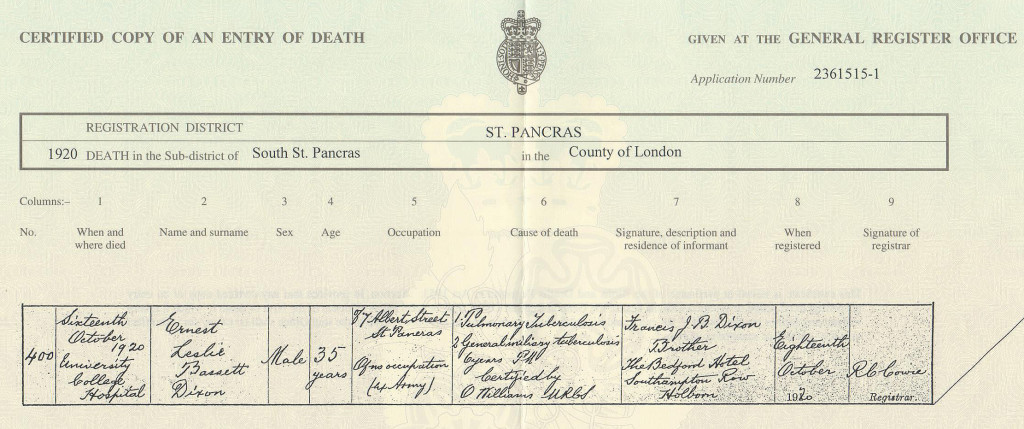 Ernest Dixon did not leave a will and died intestate. By 1920 both his parents were deceased and his estate was left to his brother Francis who died in 1960 (Lancashire Evening Post – Friday 22 October 1920):
Ernest Dixon did not leave a will and died intestate. By 1920 both his parents were deceased and his estate was left to his brother Francis who died in 1960 (Lancashire Evening Post – Friday 22 October 1920):
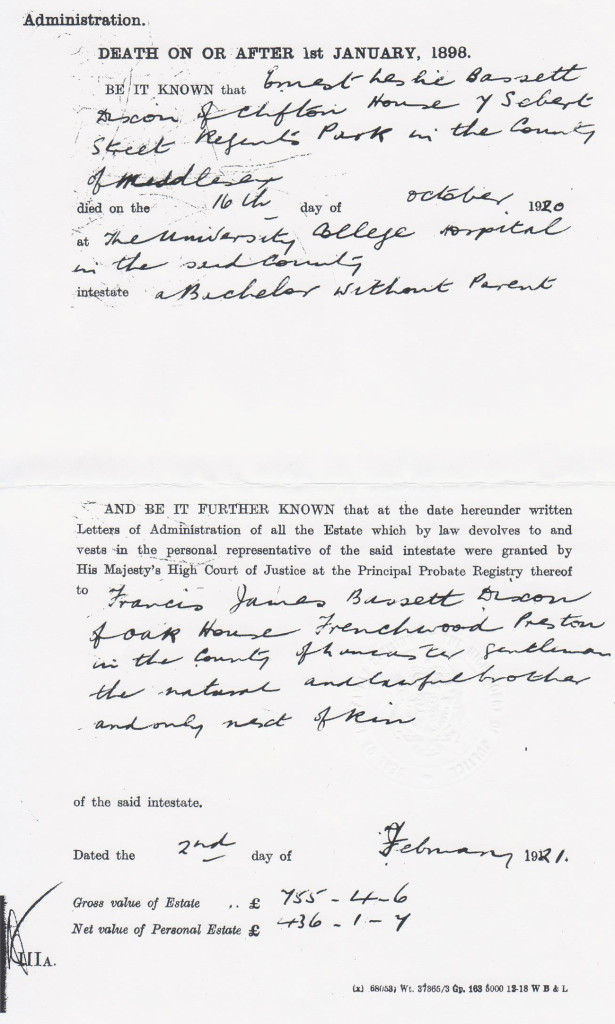 George Douglas Clementson was born 18 Jan 1880 at Ashton under Lyne, Lancashire, England. His mother was Miriam Constance Clementson (née: Ousey) and his father was George Edward Clementson. The 1911 UK census shows George Douglas Clementson (aged 31) living at home with his parents and the rest of his family at Belmont North Promenade, St Annes-on-sea. He is described as an “out of work solicitor”. Quite likely George Clementson was unable to find work as a lawyer after this event in 1907. George died in 1958 on the 27th August aged about 78 at 5 Church Street, Peel, Isle of Man.
George Douglas Clementson was born 18 Jan 1880 at Ashton under Lyne, Lancashire, England. His mother was Miriam Constance Clementson (née: Ousey) and his father was George Edward Clementson. The 1911 UK census shows George Douglas Clementson (aged 31) living at home with his parents and the rest of his family at Belmont North Promenade, St Annes-on-sea. He is described as an “out of work solicitor”. Quite likely George Clementson was unable to find work as a lawyer after this event in 1907. George died in 1958 on the 27th August aged about 78 at 5 Church Street, Peel, Isle of Man.
According to Manx National Heritage “He (George Douglas Clementson) came to Peel from Lytham St Anne’s, Lancashire, as a young man, about 1912, having committed some indiscretion which disturbed his family and put an end to his career as a solicitor, although it does not appear to have been a matter of professional misconduct. He lived the rest of his life in Peel, and in the absence of any occupation, he interested himself in the natural history and antiquities of the Isle of Man. He came to be well-known among the Island’s naturalists and did much valuable observation and reporting, being particularly interested in its bird life.”
© Ian Waugh. All rights reserved. Original archive owned by Ian Waugh. Public archive (census, probate, birth, death and marriage certificates) supplied by The National Archive, General Registry Office and HM Courts Service.

